Introduction to Functions -> logarithmic functions
Logarithmic Functions
Logarithmic functions are the inverse of exponential functions. The logarithm of a number to a given base is the power or exponent to which the base must be raised to produce that number. In other words, if \( a^x = b \), then \( \log_{a}b = x \).
Properties of Logarithmic Functions
- Logarithm of 1: \( \log_{a}1 = 0 \) for any base \( a \).
- Logarithm of the base: \( \log_{a}a = 1 \) for any base \( a \).
- Product Rule: \( \log_{a}(mn) = \log_{a}m + \log_{a}n \).
- Quotient Rule: \( \log_{a}\left(\frac{m}{n}\right) = \log_{a}m - \log_{a}n \).
- Power Rule: \( \log_{a}(m^n) = n \cdot \log_{a}m \).
Common Logarithms and Natural Logarithms
In mathematics, two logarithmic bases are commonly used:
- Common Logarithm: The base 10 logarithm is denoted as \( \log \) and is called the common logarithm.
- Natural Logarithm: The base \( e \) logarithm, where \( e \) is a mathematical constant approximately equal to 2.718, is denoted as \( \ln \) and is called the natural logarithm.
Graph of Logarithmic Functions
The graph of a logarithmic function \( y = \log_{a}x \) has the following characteristics:
- The domain is \( x > 0 \) (positive real numbers).
- The range is all real numbers.
- The graph approaches but never reaches the x-axis.
- The graph has a vertical asymptote at \( x = 0 \).
- The graph is reflected over the line \( y = x \).
Study Guide
When studying logarithmic functions, it's important to understand the following key concepts:
- Definition of logarithmic functions and their relationship with exponential functions.
- Properties of logarithmic functions, including the logarithm of 1, logarithm of the base, product rule, quotient rule, and power rule.
- Common logarithms and natural logarithms, and how to convert between different bases.
- Graphing logarithmic functions and understanding their domain, range, and key characteristics.
It's also helpful to practice solving logarithmic equations and applying logarithmic functions to real-world problems.
Remember to review examples, work through practice problems, and seek help from your teacher or tutor if you encounter difficulties.
Good luck with your studies!
.◂Math Worksheets and Study Guides Seventh Grade. Introduction to Functions
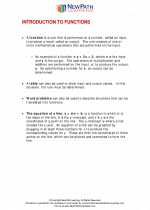
 Activity Lesson
Activity Lesson
 Worksheet/Answer key
Worksheet/Answer key
 Worksheet/Answer key
Worksheet/Answer key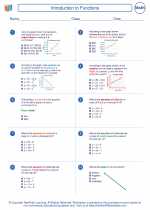
 Worksheet/Answer key
Worksheet/Answer key
 Worksheet/Answer key
Worksheet/Answer key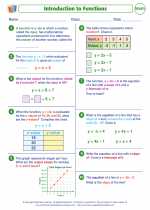
 Worksheet/Answer key
Worksheet/Answer key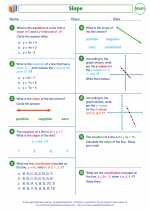
 Worksheet/Answer key
Worksheet/Answer key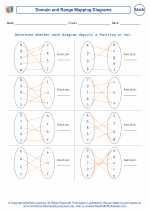
 Worksheet/Answer key
Worksheet/Answer key
